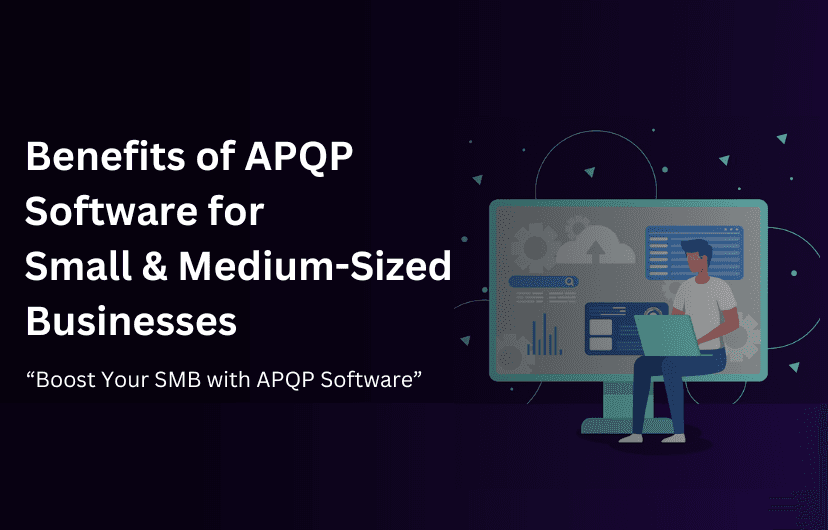Back
The Benefits of APQP Software for Small and Medium-Sized Businesses

Advanced Product Quality Planning (APQP) is a comprehensive framework designed to ensure product quality and customer satisfaction through meticulous planning, execution, and continuous improvement. While APQP is often associated with large corporations, small and medium-sized businesses (SMBs) can greatly benefit from implementing APQP processes. The use of APQP software can significantly streamline this implementation, making it more manageable and effective for SMBs. In this blog, we will explore how APQP software can be a game-changer for SMBs, providing a detailed analysis of its benefits, features, and practical implementation strategies.
Understanding APQP and Its Relevance to SMBs
Before diving into the specifics of APQP software, it’s important to understand what APQP entails and why it is relevant to SMBs. APQP is a structured approach used to develop products that meet customer requirements and ensure quality from the initial concept to full production. It consists of five key phases:
- Plan and Define Program: Establishing the project’s objectives, timeline, and deliverables.
- Product Design and Development: Designing the product and ensuring it meets all specifications and requirements.
- Process Design and Development: Developing the manufacturing process to ensure it can produce the product consistently.
- Product and Process Validation: Validating that the product and process meet the required standards and specifications.
- Production Launch, Feedback, and Assessment: Launching the product into production and continuously improving based on feedback and performance data.
For SMBs, implementing APQP can lead to improved product quality, enhanced customer satisfaction, reduced costs, and streamlined processes. However, the complexity and resource demands of APQP can be challenging for SMBs to manage without the right tools. This is where APQP software comes into play
The Role of APQP Software in SMBs
APQP software is designed to automate and streamline the various processes involved in APQP, making it easier for SMBs to implement and manage. Here are some keyways in which APQP software can benefit SMBs:
1. Streamlined Documentation and Record-Keeping
APQP involves extensive documentation at every phase, from initial planning to final production. For SMBs, maintaining this documentation manually can be time-consuming and error prone. APQP software centralizes all documentation in a digital format, making it easier to create, manage, and retrieve documents. This ensures that all necessary records are up-to-date and easily accessible, facilitating better compliance with industry standards and regulatory requirements.
2. Improved Collaboration and Communication
Effective APQP implementation requires collaboration across various departments, including design, engineering, manufacturing, and quality assurance. APQP software provides a unified platform where team members can collaborate in real time, share information, and communicate seamlessly. This enhances cross-functional collaboration, reduces miscommunication, and ensures that all team members are aligned with the project’s objectives.
3. Enhanced Project Management
Managing an APQP project involves coordinating multiple tasks, timelines, and deliverables. APQP software includes robust project management tools that help SMBs plan, track, and manage their projects more efficiently. Features such as Gantt charts, task assignments, and milestone tracking enable project managers to keep the project on schedule and ensure that all critical tasks are completed on time.
4. Risk Management and Issue Tracking
One of the key aspects of APQP is identifying and mitigating risks early in the product development process. APQP software includes tools for conducting Failure Mode and Effects Analysis (FMEA), which helps identify potential risks and their impact on the product. The software also allows for tracking issues and implementing corrective actions, ensuring that risks are addressed promptly and effectively.
5. Data Analysis and Reporting
APQP software provides powerful data analysis and reporting capabilities, enabling SMBs to monitor and evaluate their processes continuously. By analyzing data from various phases of APQP, businesses can identify trends, pinpoint areas for improvement, and make data-driven decisions. Customizable reports and dashboards provide real-time insights into project status, quality metrics, and overall performance.
6. Scalability and Flexibility
APQP software is scalable and can grow with the business. For SMBs looking to expand their operations or introduce new products, the software can easily accommodate increased complexity and volume. Additionally, APQP software is flexible and can be tailored to meet the specific needs and processes of the business, ensuring that it fits seamlessly into existing workflows.
Key Features of APQP Software for SMBs
To fully appreciate the benefits of APQP software, it’s important to understand the key features that make it a valuable tool for SMBs. Here are some of the essential features to look for in APQP software:
1. Centralized Document Management
- Document Templates: Pre-defined templates for APQP documentation, such as control plans, FMEAs, and PPAPs (Production Part Approval Process).
- Version Control: Track changes and maintain the version history of all documents to ensure accuracy and compliance.
- Document Storage: Securely store all APQP-related documents in a centralized repository accessible to all relevant team members.
2. Collaboration and Communication Tools
- Real-Time Collaboration: Enable team members to work together on documents and tasks in real time, regardless of location.
- Messaging and Notifications: Integrated messaging systems and automated notifications to keep team members informed of updates and deadlines.
- Role-Based Access: Define user roles and permissions to control access to sensitive information and ensure data security.
3. Project Management
- Task Management: Create, assign, and track tasks to ensure all aspects of the APQP process are covered.
- Milestone Tracking: Set and monitor project milestones to ensure the timely completion of key deliverables.
- Resource Allocation: Manage and allocate resources effectively to avoid bottlenecks and ensure optimal productivity.
4. Risk Management and Issue Tracking
- FMEA Tools: Conduct comprehensive Failure Mode and Effects Analysis to identify and mitigate risks.
- Issue Tracking: Log and track issues, assign corrective actions, and monitor resolution progress.
- Risk Assessment: Evaluate and prioritize risks based on their potential impact on the project and product.
5. Data Analysis and Reporting
- Real-Time Dashboards: Visualize key metrics and project status in real time through customizable dashboards.
- Reporting Tools: Generate detailed reports on various aspects of the APQP process, including quality metrics, project progress, and compliance status.
- Data Integration: Integrate with other business systems to consolidate data and gain a holistic view of operations.
Implementing APQP Software in SMBs: Practical Steps
Implementing APQP software in an SMB requires careful planning and execution to ensure a smooth transition and maximize benefits. Here are some practical steps to help SMBs implement APQP software effectively:
1. Assess Current Processes and Needs
Before selecting and implementing APQP software, it’s important to assess the current APQP processes and identify areas that need improvement. Understand the specific needs of your business and determine which features and functionalities are most critical.
2. Select the Right APQP Software
Choose an APQP software solution that aligns with your business needs and goals. Consider factors such as ease of use, scalability, integration capabilities, and customer support. Look for software that offers a free trial or demo to evaluate its suitability for your organization.
3. Plan the Implementation
Develop a detailed implementation plan that outlines the steps, timelines, and resources required for a successful deployment. Assign a project manager to oversee the implementation process and ensure that all team members are on board and understand their roles and responsibilities.
4. Train Your Team
Provide comprehensive training for all team members who will be using the APQP software. Ensure they understand how to use the software’s features and functionalities effectively. Ongoing training and support should be available to address any questions or issues that arise.
5. Customize the Software
Customize the APQP software to fit your specific processes and workflows. Configure templates, set up user roles and permissions, and integrate with other business systems as needed. Tailoring the software to your unique requirements will enhance its effectiveness and usability.
6. Monitor and Evaluate
After implementing the APQP software, continuously monitor its performance and gather feedback from users. Evaluate the software’s impact on your APQP processes and overall business operations. Use this feedback to make any necessary adjustments and improvements.
Conclusion
APQP software can be a powerful tool for small and medium-sized businesses, enabling them to implement and manage APQP processes more effectively. By streamlining documentation, enhancing collaboration, improving project management, and providing robust data analysis and reporting capabilities, APQP software helps SMBs achieve higher product quality, greater customer satisfaction, and improved operational efficiency.
For SMBs looking to stay competitive and meet the ever-increasing demands of customers and regulatory bodies, investing in APQP software is a strategic move. With the right software and a well-planned implementation strategy, SMBs can harness the full potential of APQP and drive continuous improvement in their product development processes.
Solution
One effective solution that stands out is SmartAPQP. This comprehensive APQP software offers a range of features designed to meet the unique needs of SMBs, including centralized document management, real-time collaboration tools, robust project management capabilities, and advanced risk management and data analysis functions. By choosing SmartAPQP, SMBs can streamline their APQP processes, enhance cross-functional collaboration, and ensure compliance with industry standards, ultimately leading to improved product quality and customer satisfaction.
Investing in SmartAPQP is a smart choice for SMBs aiming to optimize their product development processes and achieve sustainable growth in a competitive market. With its user-friendly interface, scalability, and customizable features, SmartAPQP can be the key to unlocking the full potential of APQP for your business.



